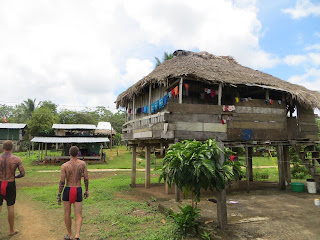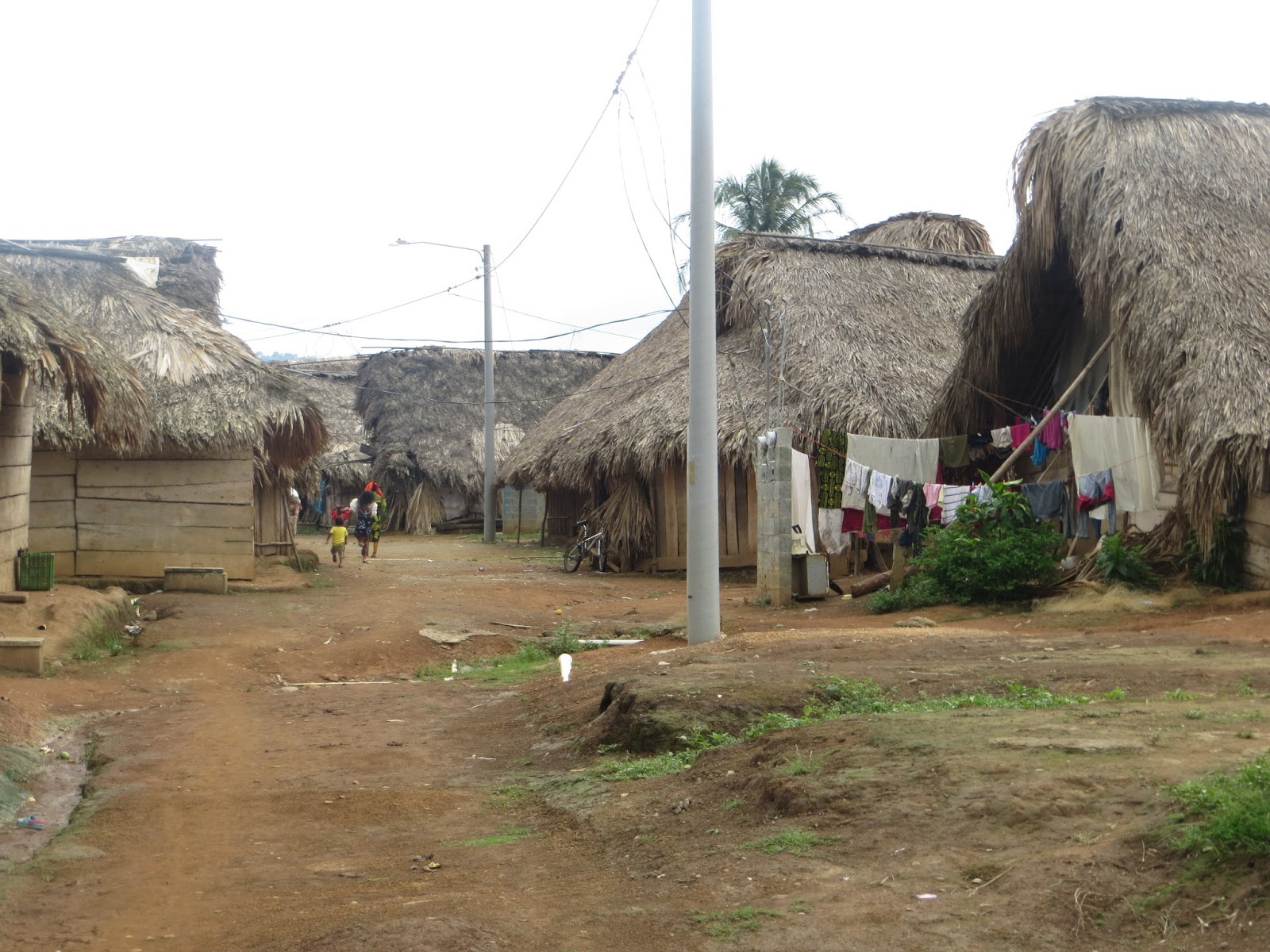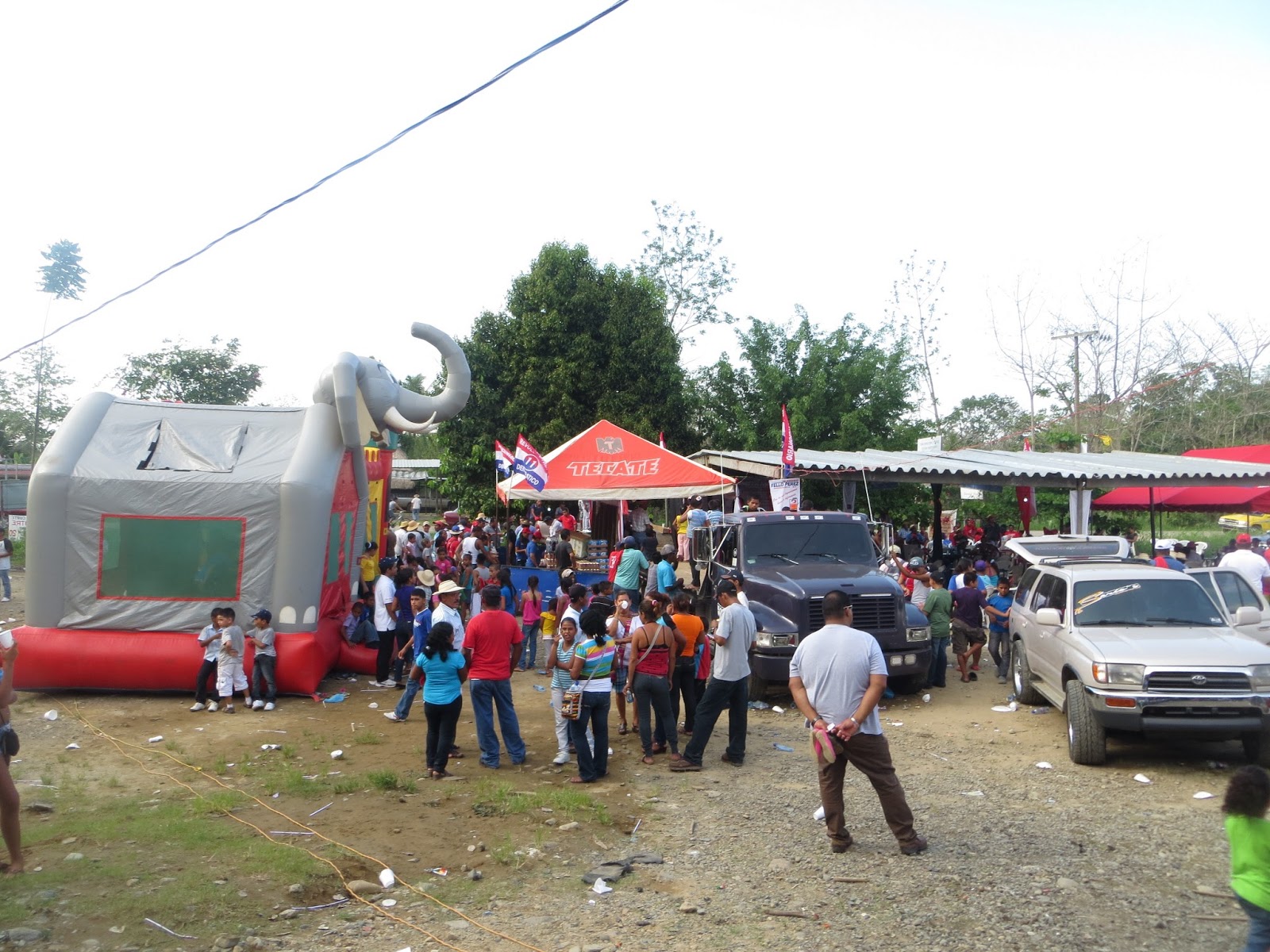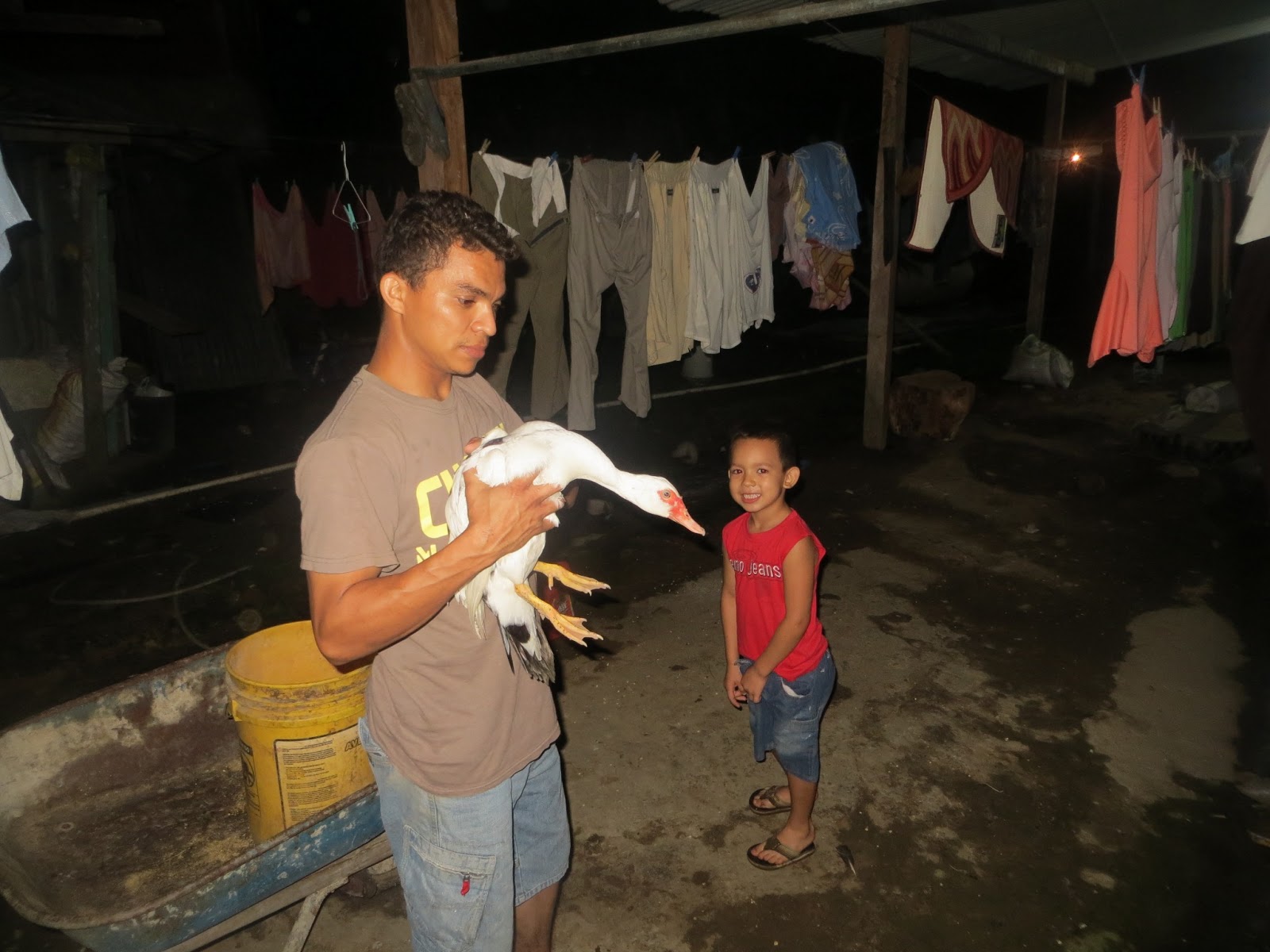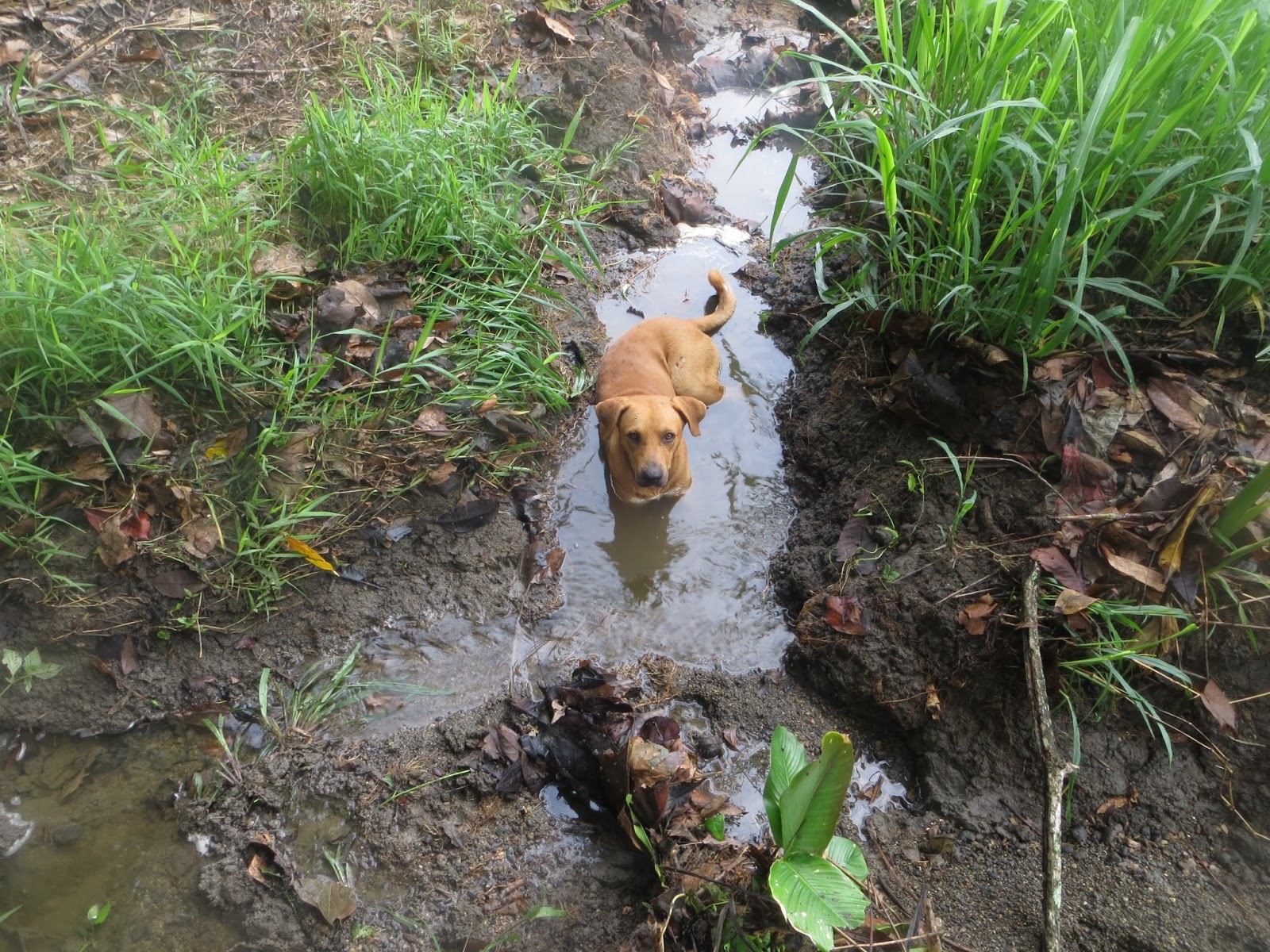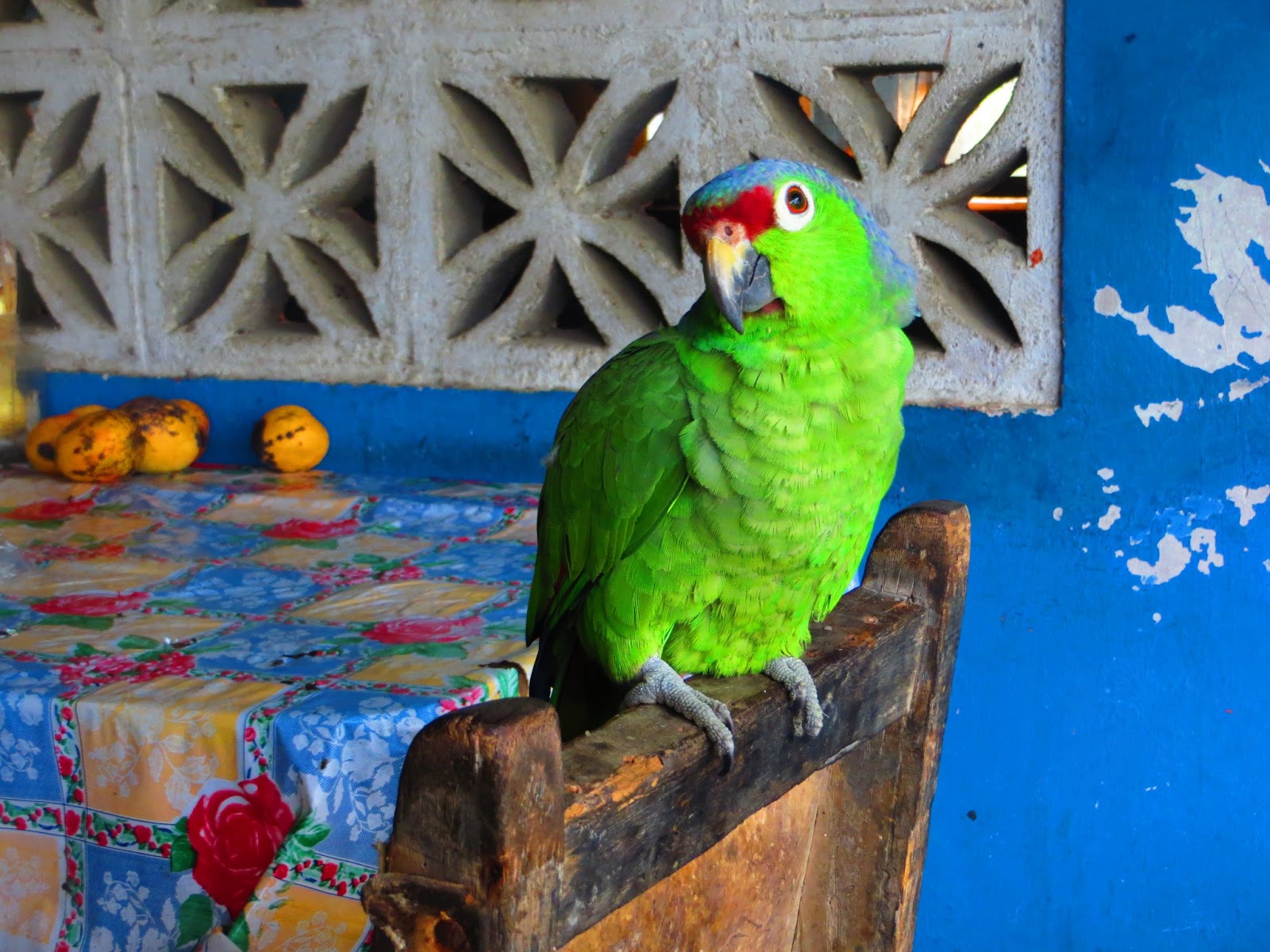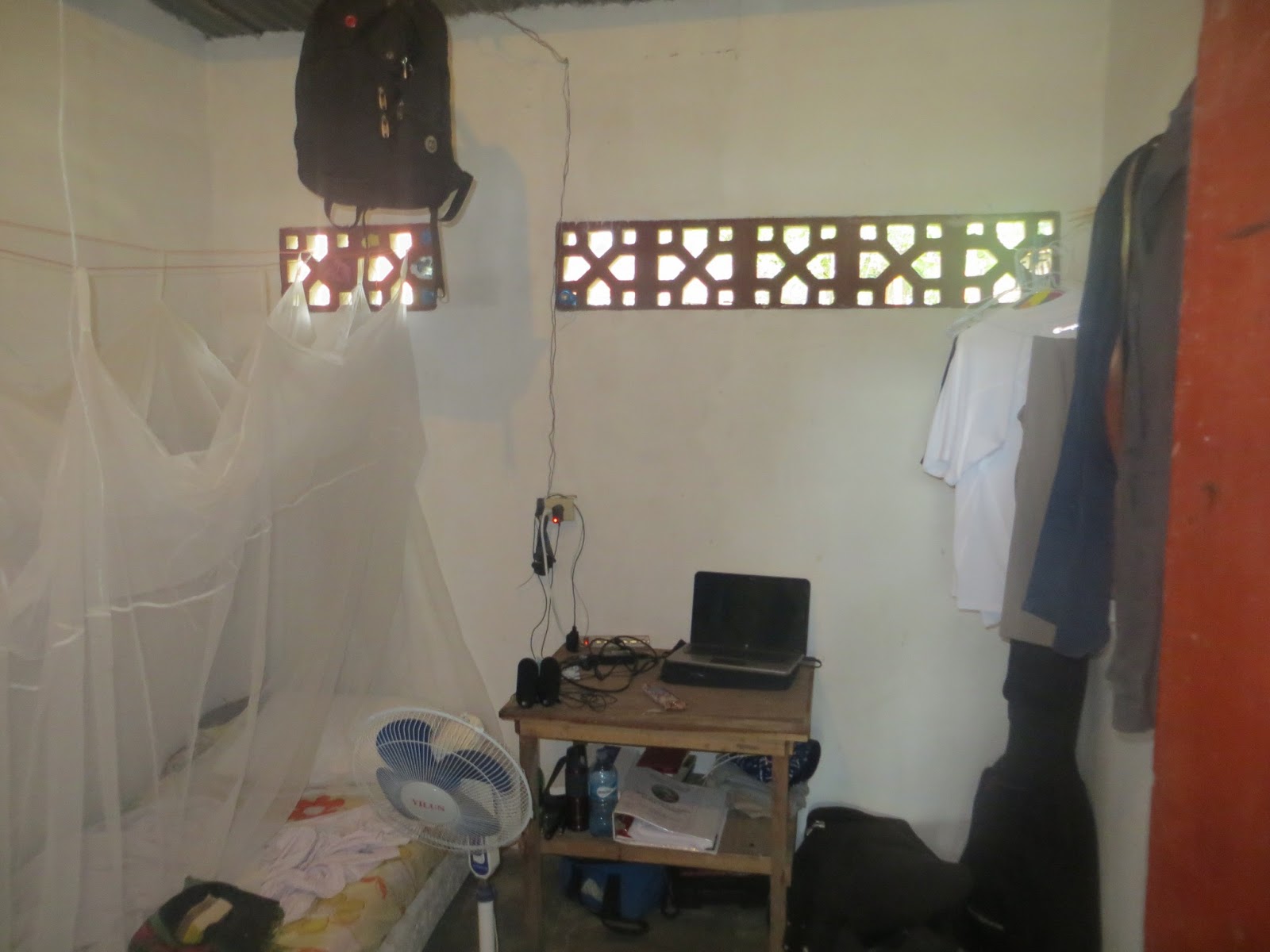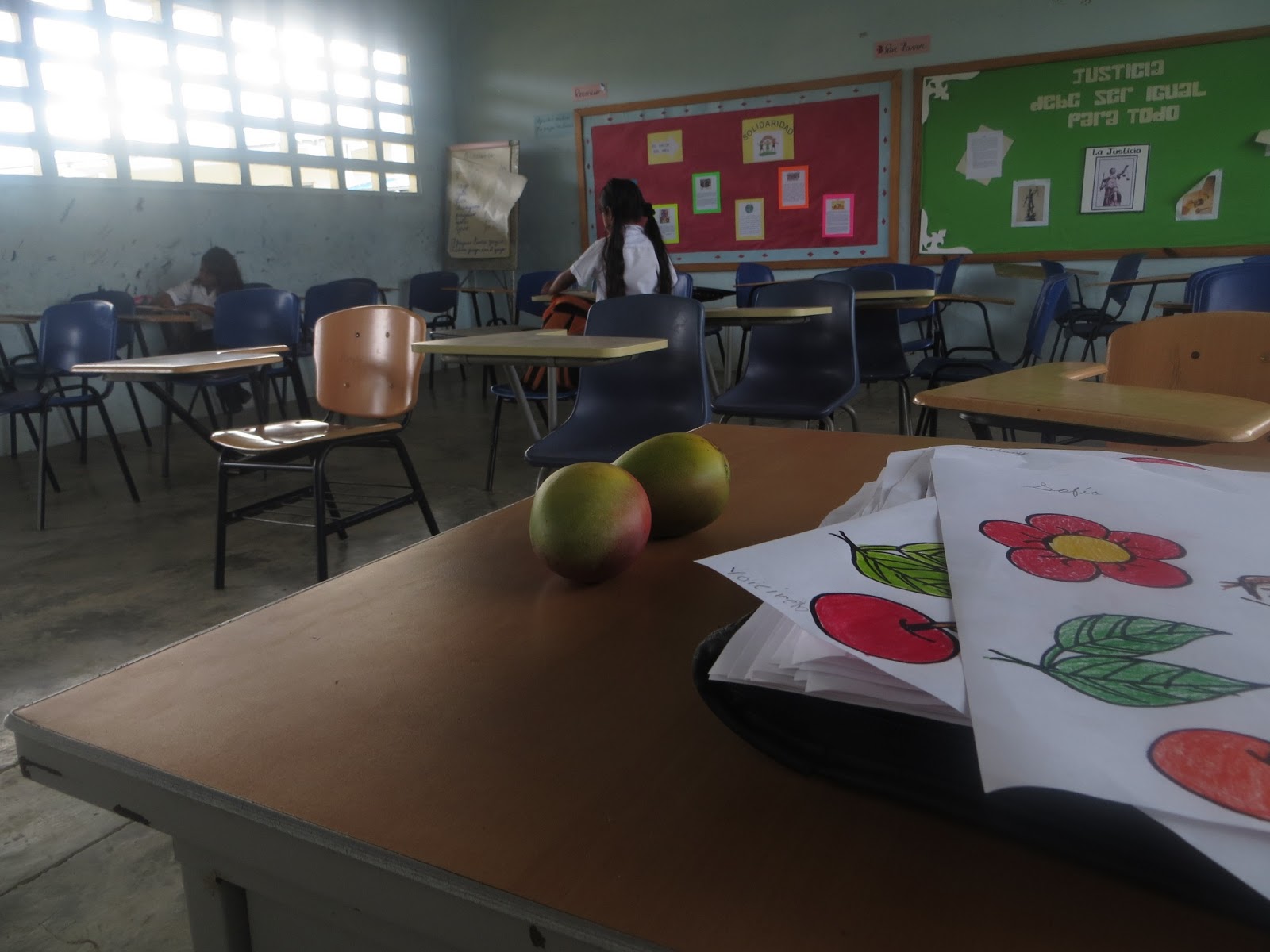School has been going well, continuing my observations, getting to know more niños and building trust with my teachers. Remembering names is a constant struggle.
-One highlight: English week became English day, and it was a day full of dancing to English pop-songs, Mr. and Miss English candidates doing risky catwalk moves (whatever that means), some presentations in English (dialogues, a speech, Romeo and Juliet death scene), and lots of whooping and yelling. It was semi-organized, there were technical difficulties with microphones, music, and what-have-yous, students weren't present or ready for their parts on time, etc. So as Spanish-speaking MC, alongside my English-teaching counterpart, who was super stressed while we reached the brink of chaos, I smiled, kept calm, accepted the reality of Panamanian school events, and played some jams on my ipod during the times of utter confusion. Overall, it actually turned out pretty good, and was quite funny, especially the high-schoolers dancing in a rather "modern" way to some Sean Paul fist-pumping club song. To close out the English week presentation, a muchacha from sexto año (senior year) sang "Scarborough Fair" with a backing choir and killed it. Beautiful, and for me, redeemed Panamá's English music taste that I have heard, especially after spending an entire week listening to junior high students sing "I'm glad you came," by some little British boy-band wankers.
For the next month of observations in the school I am really going to focus my extra time on organizing books in the library so we can utilize them more in the class as well as encourage the kids to read more (in whatever language, honestly). Also, there is a really nice language lab that doesn't seem to be used, and another lab with computers and internet that is sometimes used, but I have heard numerous explanations and stories about what works and doesn't work, or if these mythical computers, internet, or labs actually exist. Panamanian mis(or lack of)communication. My investigations will continue. I'd love to have access to a language lab, and since the government gives laptops to all kids nationwide (little white plastic things that they refer to as "wafleros," a.k.a. waffle-maker; clever nickname but i haven't seen a waffle yet here), I would like to connect them to positive, educational resources and English learning websites.
Anywho, as I hang in la hamaca on this cool Saturday afternoon, after a solid day of sembrando yuka, I'd like to fill the world in on my goings-on...
As promised, I'd like to follow up on the manventure to Ben's site in Nuevo Vigía, Darién, in the Emberá Comarca. I was super-stoked for my first trip to the dirty D. Andrew, an Environmental Health volunteer who lives in a community a ten minute bus ride plus a 2 hr walk in the hill lands away from Tortí, called my early in the morning as he rolled in on a bus heading to Darién. I hopped on and we headed East. At the Senafront (frontier police organization) checkpoint before Santa Fe, I was able to enjoy one of the perks of Peace Corps when, as everyone else has to unload from the bus and allow the frontier police dressed in camo search their stuff, we simply flashed our cheap-looking, laminated Peace Corps badge and they military dudes waved us through. We grabbed breakfast with Aja in Metetí, apologized that she was not invited to the manventure, but Andrew explained that, as there is a lack of dudes out East, this was a necessary manscursion. They also had to break in the new guy, me, who as a TE volunteer, had a lot to proove to these I-live-in-the-rainforest-hunt-my-dinner-with-spears-and-build-aquaducts kind of fellas. Then we met another EH volunteer in Metetí, Chris, who also lives in an Emberá community (oh btw, Emberá is another indigenous group native to Panamá. They rock.) We snagged some veggies (even some broccoli) for Benjamin, who, despite being surrounded by dense jungle, doesn't enjoy too many edible green plants. We then took a cab another half hour to a town on the Chucunaque River, chatted with some more Senafront police, gave them our info. (either because they are worried about us being kidnapped by the FARC from Colombia, or suspicious of us gringos rolling in to the jungle to smuggle coke, kill jaguars, whatever may have you), had lunch, waited for a few hours, and finally paid for gas and jumped in a piragua (30ft long dug-out canoo with a Yamaha boat engine attached to the back.) After about a half-hour boat ride up the river, we arrived to Ben's community. (No cocodrillos spotted in the river that weekend, but Chris said he counted 30 one time in his river while cruising up to his site : o).


As we glided toward the shore of Ben's community, I didn't know what to expect. Images from Apocalypse Now kept flashing in my mind, with Ben as Kurtz, surrounded by indigenous children with bows and arrows. Close.. Not really... There were smiling, curious children yelling for Benja (Benhaa) to come retrieve his gringo pals. The community was lovely, and they love their Benja. All of the houses are wooden, open, sitting high on stilts with roofs covered in penca. The school is very nice, they have some sidewalks, some small tiendas and couple cantinas, and two basketball courts! A few years ago there was a huge flood that forced the majority of the families that live next to the river to relocate up on hill (where Ben lives now). The bank was about 10 feet from the water when we visited, and their houses are another ten feet off the ground, so this was a nasty flood. Some of the town just recently acquired electricity, and they have an aqueduct (Ben's primary project) that pumps somewhat decent water to some plumas placed around town. There are virtually no latrines, so Ben's next project has to do with latrine construction, which is tough because typical pit latrines would not function due to the high water table of the land, so they would have to construct composting latrines. Anyway, manventure got a whole lot manlier when he showed me the bathroom; a 5gal bucket with some rice husks for coverage. He had recently acquired a really nice toilet seat for it though!


Mantasia was an awesome weekend. It was really cool getting to know the Darién fellas. We enjoyed some rum, scotch, and euchre under flashlights in the night, tried to dodge/destroy undestroyable mosquitos (for real, you'd smash them and they would simply buzz away), cooked a lot of veggies, pasta, patacones, oatmeal, guac, etc., and shared stories about PC, Darién, their epic hiking adventure to Kuna Yala, bowel movements...This becomes a part of natural, casual conversation in the PC world. "Solid" has become an ever more telling response to "how's it going." We also went hunting with some Emberá fellas one morning, which consisted of an hour or so hike in the dense, humid rainforest, abundant with mosquitos and chitre, another flesh-eater, until we got to a spot. Then, the Emberá fellas told us to stay put with the horses, while they disappeared into the jungle to hunt for conejo (jungle rabbit) and venado (jungle deer). So the gringos got left behind, so we hung out in the jungle made spears and practiced our throwing skills, in case we encountered a potential dinner. We did see an Aguilar Harpía (Harpe Eagle) though, a pretty rare bird that only exists in Latin America, which was sweet. And our pals came back with a deer, so we enjoyed some delicious venison.



We also hooped a bit, which was a blast! The Emberá love basketball, and despite lacking technical skills and some fundamentals, were pretty solid ballers. Ben and an Emberá dude took Andrew and I down one afternoon, and I thought I was going to keel over with heat stroke. Playing basketball under the afternoon sun in jungle heat was intense! Nothing that a nice cold duro (frozen fruit popcicle in a plastic bag) couldn't fix.
The coolest part of the weekend, however, was getting painted with the Jagua fruit. Ben consiguir-ed some Jagua and we grinded the fruit up with a shredder made out of a sardine can. His neighbor mixed the Jagua with a little agua and then cooked it for a hot sec., then used a plantain branch to paint designs on us, covering our entire torso and arms, front and back. They usually do the whole body, feet to mouth, and all the designs/lines usually mean something. She just said she was going to paint us like tigres. It was an awesome experience, the natural tattoos lasted about two weeks. Can't wait to be pintado again!



The Emberá people were very cool. Super friendly, simple, loving, and apparently they can be crude in their humor at times, as have heard from the many volunteers who live in the Comarca. I was super impressed by Ben and Chris's handle on the Emberá language. They came in to PC with little Spanish, and have become solid with both. The entire weekend, they demonstrated a Emberá conversation in English, and it had me rolling in laughter.
Example : -Hey Benja, whacha doin, ya cooking?
-Yep, I'm cooking
-Really?
-Really.
-Alright, keep cooking then.
It's beautiful, simple, and brilliant. And always pleasant.
Our last night in Nueva Vigia, we roasted up some chorizo y salchicha over a fire and made s'mores. The stars in this jungle village at night were absolutely breathtaking. Soaking everything under the cosmic ceiling was very special and, despite the bloodsuckers, the mud, and lack of amenities, I felt extremely appreciative to be alive in that moment, in that time, in that place.
After the manventure in the jungle, we had our Panamá Este/Darién regional meeting in the city, so we stayed in a nice hostel in Casco Viejo, enjoyed some hot showers (which were amazing, especially after being munched by mosquitos), and enjoyed some civilization, beer, and nightlife. The four of us got some pretty curious looks from the city Panamanians as we strode through the city with our Jagua tattoos. It's fascinating the reactions you get by moving between cultures here in Panamá. We act as bridges even within the country.

My next noteworthy adventure was to a fellow PCV named-Chelsea's site at Pueblo Nuevo, a 20 minute boat ride across Lago Bayano. She invited a bunch of volunteers to come help out with a medical mission put on by a church group from Alabama. We translated and did some health charlas about water and diabetes. Chelsea's site is awesome. She lives in a wooden house with a penca roof (like Benja's) that looks out to the lake (and the sprawling, dead trees that tower out of the water). She has no electrity, but we enjoyed some wine and incredible cooking (pasta, curry, guacamole, salad) and wine at night while listening to random English 80s jams played through the Voz Sin Fronters Darién radio station. The gira was a great success, and a solid number of people turned out in the small community to see the dentist and doctors who were there. I really enjoy working with the medical giras. It's great to work with with other Americans and different organizations, sharing experiences and perspectives, and translating is a pretty cool yet demanding job. And hanging with fellow volunteers is always wonderful.




Before we all headed back to our subjective homes, we embarked on an adventure to check out one of Chelsea's primary projects; Eco-tourism in the caves of Pueblo Nuevo. Las cuevas were incredible. We entered the caves with our headlamps, led by out trusty guide Pepe. The caves are up a stream that leads into Lago Bayano, and seeing as the lake was formed during the construcction of a huge hydroelectric dam, which powers most of Panamá city, her community, and the discovery of the caves, are new phenomena. Huge cliffs tower over the river, and at a few parts in the caves there is total darkness. At one point, we were walking in total darkness through water that was chest-high, with bats fluttering and screeching above. Then, as I had heard from some pals who had seen the caves before, we saw it; the baby crocodile that chills in the pitch black cave lagoon. It's orange eyes burned above the water, still as dark water, until it submerged itself. We moved forward briskly, without panicking, telling ourselves that this creature feels much more threatened by us than we by it. That said, if the mama was around...Apparently no one has seen her, and the river dries up before it gets to the lake. But during this rainy season the river will most likely flow into Lago Bayano, so who knows if the mama will return for her the little guy. Pepe also killed an Equis in the cave, one of the most venomous snakes in Panamá. It wasn't agressive and seemed to be dying before Pepe finished it off, and I felt for the fella for a second. Then I remembered that his bite what send me on a race against the clock to survive. So it goes. Cycles, circles, life, nature, survival...all that jazz......We hiked through the caves for about an our, until we reached a solid swimming hole, jumped off some cliffs into the pristine mountain fed river water, climbed rocks, and explored the mini waterfalls until we had to return. It was an awesome couple days.

I really enjoy living out East, in the frontier land. I love the diversity of indigenous and latinos who had immigrated within the last 50 years. Living near the jungle allows me to see development in a fascinating way, with ramped deforestation (and battle for conservation and reforestation), and the growth of highway towns, and even in the indigenous Comarcas, with more and more access to water, electricity, supermarkets, and internet. Also, there are volunteers from all 4 sectors out here, doing a lot of cool, different projects with water sanitation and access, sustainable agriculture, environmental conservation, hydroelectricty, and English (represent...haa)... I have an incredible opportunity to interact with a variety of people. My fellow volunteers kick ass, and I have so much to learn from them. So much love and support always as well. Oh! I also went to the Despedida/farewell for my pal Beth Frailey, who recently finished her service in Platanilla. It was very sweet and pretty amazing to see how much the people really appreciate our time here. She became a beloved member of families and of the community. One of the English teachers she worked with even sang "Hero" by Mariah Carey at the ceremony for her! Tears flowed. It was lovely. A group of us stayed at Beth's place for her last night. It was so cool witnessing the different perspectives of volunteers in different stages in their service. So much growth and change. I can't wait to collaborate on projects and learn so much from such groovy people.
Many more adventures to be had. Spending time in the school and with the fam, cooking, getting out on the farm, running down the dirt path that cuts through the jungle mountains, reading, learning the blues...I have a whole lot of time for exploration, inside and out. It's crazy how when you travel around, and when you adapt to a new place and a new life, how memories of what home is, where and who, come rushing through. In that sense, this experience is very spiritual, kind of like a retreat, where you have a lot of time to ponder, appreciate and find peace.
Happy belated Father's Day to all the Papas out there, especially Jiimbovett. Also thinking of Ray Vetter and Russell Scott, two abuelos that have sent some super positive waves into history through the creation of two stellar families. Feeling lucky, feeling alive. Saludos!

BTW/P.S.: A lost perrita found me while I was chillaxin the hamaca the other night. Not sure if I am going to keep her, but she came out of nowhere and seems pretty content staying here (with me feeding here). Not really looking to care for a dog, and my family already has a zoo, but she's a sweetie, and a pest. My host brother and I named here Tortilla Luna.

